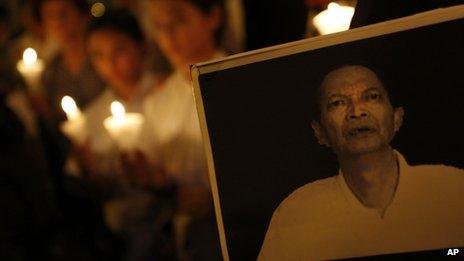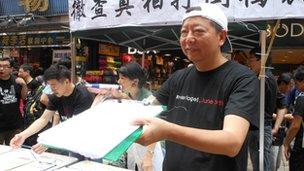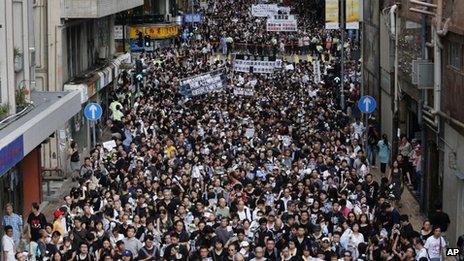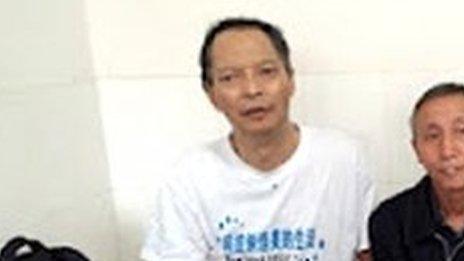Li Wangyang: Hong Kong asks who killed Tiananmen activist
- Published

Mr Li's supporters believe he may have been murdered
Blind and deaf after two decades of imprisonment as a Tiananmen Square activist, Li Wangyang was a defiant symbol of the unrealised promises of democracy in China.
His suspicious death on 6 June, just days after he vowed to press ahead the fight for universal suffrage, has caused an uproar in Hong Kong, where public opinion has forced the Chinese government to promise to re-open a criminal investigation into his final moments.
Mr Li's death at a hospital in the central province of Hunan was initially ruled a suicide, before it was re-classified as an accident.
He was reportedly found hanging from the hospital window with a strip of cloth around his neck.
But the public, as well as Mr Li's friends and supporters in China, believes the disabled activist, who was in his 60s, may have been murdered because of his politics.
'Responsibility for democracy'
His death has special resonance in Hong Kong, where the 1989 Tiananmen Square killings highlighted the former British colony's fears about Chinese rule, and because one of his last interviews was with a Cantonese-language cable television station.
"Each ordinary man has a responsibility for democracy, for the well-being of the nation. For China to enter a democratic society sooner, for China to realise a multi-party political system sooner, I will not look back even if I have to risk my head," he was quoted as telling Hong Kong's iCable.
Mr Li's supporters doubt whether a fair, objective assessment will be made.
That is why volunteers gathered in Hong Kong on Sunday to urge passers-by in the busy commercial district of Mongkok to sign a petition demanding a proper, transparent investigation.
A steady stream of people stopped to sign the petition, which has garnered 50,000 signatures.
The youngest signatory was five-year-old Christopher, who scribbled his name alongside his mother Coris Leung.
"We are from Hong Kong, but we are also Chinese. I want him to understand our culture, our history and what really happened to this man," she said.
Don Mak, who describes himself as largely apolitical, said he felt angered and frustrated by Mr Li's death.
"One of the fundamental rights of a human being is the right to live and the right to free speech. He was deprived of both," said the 22-year-old university graduate.
Volunteers plan to gather 100,000 signatures before presenting the petition to Chinese President Hu Jintao, who is expected to visit Hong Kong at the end of June to celebrate the 15th anniversary of the city's return to China - again highlighting the case's potential sensitivities.
Politicians united
Hong Kong is a city split between two political camps: the pan-democrats who are generally critical of the authoritarian rule of the Communist Party in Beijing, and the pro-establishment lawmakers who generally support the central government.

Lee Cheuk-yan says protest sentiment is bubbling in Hong Kong
But in the Li Wangyang case, the two sides have largely come together to demand accountability.
Lee Cheuk-yan, chairman of the Hong Kong Alliance in Support of Patriotic Democratic Movements in China and head of the pan-democratic Labour Party, believes anger from all strata of Hong Kong society has put pressure on the pro-establishment lawmakers.
In September, the members of Hong Kong's parliament, called the Legislative Council, will face re-election. All eligible voters are allowed to participate.
On 10 June, Mr Lee led 25,000 people on a protest march that culminated in a gathering at Beijing's Liaison Office in western Hong Kong.
He said it was the biggest-ever protest at the central government's representative office. Police said 5,000 people attended the march.
"We protested over the jailing of Ai Weiwei and Chen Guangcheng," said Mr Lee, referring to two of China's best-known dissidents.
"But this case is different. This time somebody died. Li Wangyang is obviously a victim of Tiananmen. He was maimed, blinded and made deaf during his imprisonment. His death is a very clear case of the high-handed, tyrannical way the government dealt with a citizen. We are demanding justice."
Rita Fan, Hong Kong's delegate to the elite Standing Committee in China's parliament, has written to the National People's Congress to express the people's doubts.
And over the past week, senior civil servants in the Hong Kong government, from Food and Health Secretary York Chow to Chief Executive Donald Tsang, have made rare public statements saying Mr Li's death was indeed suspicious.
Civil servants are meant to be above the political fray, so their comments demonstrate the amount of official support for a thorough investigation.

Organisers said 25,000 people took part in this protest march in Hong Kong on 10 June over Mr Li's death
Hong Kong's future
A report last week, external from the Beijing-backed Hong Kong China News Agency quoted a public security official in Hunan province as saying forensic experts from outside the province had been commissioned to carry out an autopsy.
Experienced criminal investigators were also now involved, the spokesman said.
But Mr Lee, the pan-democrat lawmaker, said there was widespread doubt on the mainland and in Hong Kong whether the investigation would be effective. Most of the evidence seems to be gone.
Mr Li's body was taken away by police just hours after it was found, according to his family and friends. The body was reportedly cremated a few days later on 9 June, against the wishes of the family.
It is unclear how, without the body, a new autopsy can be conducted.
But even with little evidence left, Mr Li's supporters in Hong Kong demand an investigation. They fear democratic rights in their own city may someday be curtailed if they do not make a stand now.
Even though this city is part of China, it is guaranteed the right to free speech and free assembly, both of which are unknown on the mainland.
"In Hong Kong, we have a saying, 'Today's mainland is tomorrow's Hong Kong'," said Claudia Mo, a politician for the pan-democratic Civic Party, who helped to gather signatures on Sunday.
"Some people ask us, 'What's the point? He is already dead!' Well, we may or may not win this fight. But we are here to answer to history. We are here to answer to the next generation."
- Published13 June 2012

- Published6 June 2012

- Published31 August 2012